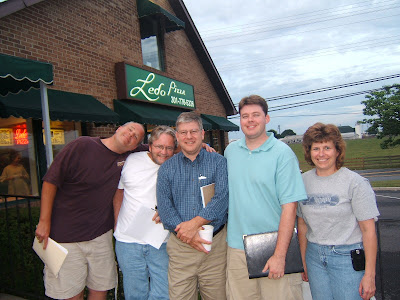Sarah Warrenfeltz traveled to New Orleans with the KatrinaGrace Team that left for the area on 14 January 2007. Afterwards she penned this essay: I was deep in the woods of New York when Hurricane Katrina hit. My Christian high school had taken its students on a week long retreat at Lake Champion, a Young Life camp. There, we had neither cell phone service nor even any radio reception. When I reentered civilization Friday afternoon, I was astounded at the disaster before me. Reports of eleven feet of flooding in homes, twenty foot tidal waves, people trapped in their homes as the water rose to their deaths; all this and more were prevalent on every news station.
I do not believe the magnitude of this disaster hit me until Hurricane Rita moved in to kick New Orleans while it was down. I cried out in anger to God, asking Him how he could continue to destroy these people’s homes and lives. What does God do in a time of crisis? I wondered.
My father’s actions and Pastor Michael Sprague’s words answered my questions—God mobilizes His body of believers. Seven weeks after the storm, my dad flew to Trinity Church with a team from our church, Grace Community. He called my mom and me at least once a day with stories that further shattered our broken hearts. When he returned home after a week of gutting homes and praying with homeowners, it was with an attitude of needing to return to serve more as soon as possible.
My father’s heart inspired me to not just feel sorry for these people, but also to want to act to help them. This trip, January 14-20, 2007 was the first chance my school schedule would allow me to come down. My father returned with me.
I was bombarded with a tidal wave of unexpected criticism. Students from my college in Westminster, Maryland told me that the current news coverage of New Orleans was propaganda. There is no real disaster left, they said. Your passion for these people is delayed. They changed their arguments to fit my worldview—God helps those who help themselves, right?
Wrong. That saying is actually a Puritan proverb; it is not quoted anywhere in the Bible. I vehemently argued with them, and this only fueled my fire to help.
As we descended into New Orleans and started driving through, my confidence wavered. This truly is a gorgeous city. But I had this eerie feeling in the pit of my stomach that something was not quite right. My suspicions were confirmed—the city is wearing a beautiful mask to try to hide the ugly disaster still hurting underneath it. In a neighborhood visible from the highway, I saw a magnificent home. It was in the classic Southern plantation style with huge Romanesque columns supporting the roof. However, as I looked closer, in its shadow was a dilapidated home with a F.E.M.A. trailer sitting in the front yard.
We drove through the French quarter next. I ignored the obvious symbols of immorality—signs for gentlemen’s clubs, etc. and I admired the classic European architecture. I looked down to write in my notebook for a moment, and when I looked up again, we were in the upper ninth ward. The contrast between this and the French quarter was like night and day. The homes looked as if someone had picked them up and run them through a shredder. FEMA “x”-es, marking the dates inspected and number of dead found within the structure, were plain to the eye on what was left of a front wall. Lucky houses had a zero for a bottom number; I saw one that said six. This is when I broke down and began to cry.
On our first day of visiting homeowners affected by Katrina, I met a beautifully selfless and loving eighty-four year old woman. She owned her home herself, paid off her mortgage years before, and as she could not afford insurance, she was not required to have any. She had applied to the Louisiana Road Home federal grant program. Because she did not pay for homeowner’s insurance, they were going to grant her thirty percent less money to recover from the disaster. Had she been rich enough to afford insurance, she would have been granted more money. But because she was poor, she was reimbursed even less. Later that night I learned that in two months, this very grant program had given to eighteen out of about seventy thousand applicants and used about six hundred thousand dollars out of eight and a half billion.
This put me over the edge. Being a passionate writer, I started organizing an essay in my head and thinking of the nastiest polite language I could use to tell off our government. Then I thought, what can one lone person do? Our government is so huge, they will not even notice me, let alone listen to me. That is when God popped the mission into my head—give your time and effort. If the government will not help these people as they need, why can you not? Louisiana residents did rate religious organizations as the most helpful after the storm. I am, in fact, a Christian.
Even after all the debris is cleared away and the people have returned to their homes, there is a much more lasting damage affecting them. That damage is the scars the storm left on their hearts, and that is what I am after. I want God to use me, to be His hands and His feet reaching out to His children to show them His unfailing love. And that is why I am here.
- links were added




